FolkWorld article by The Mollis:
The new Revival
The Netherlands and Belgium see currently a big boom for folk music - Michael & Christian Moll found out the backgrounds.
 "I know the folk music scene in Europe is just in the beginning." Watching the current developments on the folk scene in the Netherlands and Belgium, I had to think of this quote of Carlos Núnez. Two huge new festivals in the Netherlands in 2000, which can well be named among the best international names of festivals like Tønder, Dranouter, Rudolstadt, at the same time an extraordinary success of Flemish bands from Belgium. This is indeed the sign of a new revival, while the background seems to be quite different in both countries.
"I know the folk music scene in Europe is just in the beginning." Watching the current developments on the folk scene in the Netherlands and Belgium, I had to think of this quote of Carlos Núnez. Two huge new festivals in the Netherlands in 2000, which can well be named among the best international names of festivals like Tønder, Dranouter, Rudolstadt, at the same time an extraordinary success of Flemish bands from Belgium. This is indeed the sign of a new revival, while the background seems to be quite different in both countries.
A Sunday afternoon in the little sleepy rural town of Sevenum in South-East Netherlands, in the backroom of a quiet café: A huge crowd of several hundred people has gathered to see Tommy Sands and Mairtin O'Connor, both more or less unknown musicians in the Netherlands. The biggest part of the audience is maybe between 35 and 40, an enthusiastic audience, buying after the show a lot of CDs. The Folkclub in Sevenum started about eight years ago, these days they have always full house at folk concerts. It is one of the many new clubs that have started during the last years, having become in some villages part of the social life.
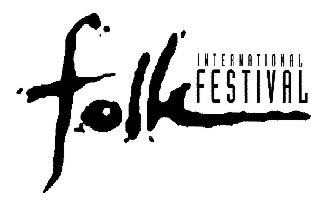 There is a huge new interest in folk music in Holland, it is like a new folk revival. "Until about 1984 English, Celtic and French folk were very popular in Holland and we even had some great Dutch groups (irolt, chimera, wolverlei etc)", explains Eelco Schilders, young contributor of the Dutch folk magazine NewFolkSounds. "But after a while I think the music wasn't new anymore and only a small group remained listening to the music. Most groups dissappeared and no new groups returned."
There is a huge new interest in folk music in Holland, it is like a new folk revival. "Until about 1984 English, Celtic and French folk were very popular in Holland and we even had some great Dutch groups (irolt, chimera, wolverlei etc)", explains Eelco Schilders, young contributor of the Dutch folk magazine NewFolkSounds. "But after a while I think the music wasn't new anymore and only a small group remained listening to the music. Most groups dissappeared and no new groups returned."
Until 1992/93, when the current "revival" started. Eltjo Toorn emphasises that the previous folkrevival was a subculture of students, while the new revival in the Netherlands is not a revival carried by young people, but by "older people and older young-people". Eltjo compiles the biggest listing for Celtic music concerts in Nederland in the internet, and is an expert for the whole Celtic scene in the Netherlands.
Another distinction of the Dutch revival is that it is located in smaller towns and villages, mainly in the South of the Netherlands; most new folk festivals are located there. Eltjo: "These festivals even get subsidy from the local authorities. In a big city, like Amsterdam, this would be impossible. In Amsterdam is a strong Cultural Elite (with a big C), that dictates what is Culture. The "Stichting Volksmuziek Amsterdam" does not get a stall anymore at the yearly "Uitmarkt" (market at the beginning of the theatre season)."
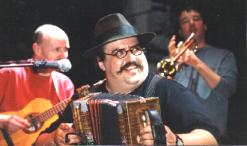 So why a revival right now? Eelco Schilders thinks that during the last few years folk got a new impulse, by new bands with new sounds, giving a new dimension to the folk scene. Bands from Scandinavia, but also bands from Belgium or Northern Spain. "They made a young audience listening to traditional music. They liked it and started to listen to more, and suddenly there is a new folkscene in europe with young people and all the 50 year old who are happy that their music is in the spotlights again."
So why a revival right now? Eelco Schilders thinks that during the last few years folk got a new impulse, by new bands with new sounds, giving a new dimension to the folk scene. Bands from Scandinavia, but also bands from Belgium or Northern Spain. "They made a young audience listening to traditional music. They liked it and started to listen to more, and suddenly there is a new folkscene in europe with young people and all the 50 year old who are happy that their music is in the spotlights again."
At the same time it still seems to be that Celtic music is the core of the Dutch scene. Eltjo thinks that especially Celtic Music, shanties and seasongs (a lot of choirs and maritime festivals arose) and klezmer music became popular. In the Celtic world, Riverdance gave during the last years a very big push to the interest in Irish music and dance in the Netherlands. Still you cannot really say that the popularity is only in one of the folk music genres.
"The point is that the total music culture is becoming grown-up now: various genres get a place in the total spectrum: the Barock and the Heavy Metal Rock exist at the same time. What I mean is, that the good music genres of the past are still alive in the present. Dividing the history into periods as in the schoolbooks is out-of-date now."
Describes Eltjo Toorn. And his description is quite caracteristic for the Dutch way of music categories: The only category is wether it is good or bad music, no matter what style.
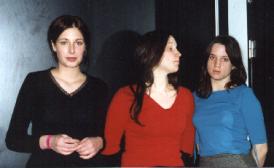 This fact is well represented in the organisational team of the Folkwoods Festival, happening in August in Eindhoven for the first time and featuring ca. 35 international folk music bands. It is organized by three persons being "just fans of good music". One of them, Tinus Kanters, is founder and organizer of the well-known Eindhoven Dynamo Open Air Hardrockfestival, with up to 100.000 visitors from all over Europe. He also organized some outdoor-classical concerts at a footbal stadium in Eindhoven. Yet 25 years ago he was also involved in the organization of the folk-club in Eindhoven. The second man, Hans Sanders, is known as a singer of Europe-wide known pop band "Bots", owning these days a pub in Eindhoven with weekly live music (often folk). Then Chris Aelbers from Belgium, currently managing director of the Beursgebouw, the main exhibition hall of Eindhoven. He used to be one of the founders and organizers of the Bilzen Festival in Belgium about 25 years ago, and he organized over 200 events in Eindhoven the last 15 years.
This fact is well represented in the organisational team of the Folkwoods Festival, happening in August in Eindhoven for the first time and featuring ca. 35 international folk music bands. It is organized by three persons being "just fans of good music". One of them, Tinus Kanters, is founder and organizer of the well-known Eindhoven Dynamo Open Air Hardrockfestival, with up to 100.000 visitors from all over Europe. He also organized some outdoor-classical concerts at a footbal stadium in Eindhoven. Yet 25 years ago he was also involved in the organization of the folk-club in Eindhoven. The second man, Hans Sanders, is known as a singer of Europe-wide known pop band "Bots", owning these days a pub in Eindhoven with weekly live music (often folk). Then Chris Aelbers from Belgium, currently managing director of the Beursgebouw, the main exhibition hall of Eindhoven. He used to be one of the founders and organizers of the Bilzen Festival in Belgium about 25 years ago, and he organized over 200 events in Eindhoven the last 15 years.
The three have involved Ad van Meurs, internationaly known singer-songwriter, center of the group "The Watchman". Ad is well known at managements, recordlabels etc, on the small but good market of music, including folk.
So in the Folkwoods team, there are people used to organise Hardrock, Classical and Pop Music, Exhibitions and, last not least, folk music. It is not often that you find such a range of interest in the organisational team of one folk festival. Tinus: "First of all, we are fans of good music inclusively folk. We think also that there is coming a revival of folkmusic, including some good, young groups. We think the time is right to give more attention to the folkmusic."
That they belive in the success, is prooved by the fact that the three of them put up the money for the festival, hoping that sponsoring, participation of the city and the entrance all together will put up enough money to have a break-even festival.
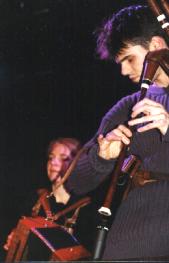 This year saw already the first highly successful edition of Tilburg International Folk Festival, and at the same time a lot of smaller festivals spring up in Holland. Eltjo: "Professional organisers discovered the folk music now. And a few old "folkies" became professional."
This year saw already the first highly successful edition of Tilburg International Folk Festival, and at the same time a lot of smaller festivals spring up in Holland. Eltjo: "Professional organisers discovered the folk music now. And a few old "folkies" became professional."
But the new uprise of festivals in Holland has another reason: "In Holland festivals appear and disappear along with the subsidization. If there is money they organise, if there isn't nothing happens". This is the view of a Belgian, Marc Baekert, editor of the Flemish folk magazine of Belgium, t'Bourdonske. "The International Folk Festival in Tilburg (Holland) had experience with Festival Mundial and The International Gipsy Festival, and got money from different foundations (Performing Arts, Prince Bernhard, Europalia) and local authorities (town & county)." He says that in Belgium there is more a tradition of self supporting organisations, although recent years similar practises started (Feestival, Winterfolk). In Belgium, the amount of new festivals is not as big and as sudden as in Holland. There is one new festival that started last year in Torhout (formerly famous for its rock duo festival with Werchter), Torhout World, "which was quite new as concept. Outside in a splendid castle park good world acts in the best conditions and a vip treatment for the complete audience! Besides this, there are only smaller new folk festivals in Belgium."
In Belgium, the folk revival lies more in the music makers scene, with a lot of new and successful folk bands. In Holland, meanwhile, it's different, as Eelco of NewFolkSounds says: "I think Holland has a very special place in this music. I'm always suprised that the Dutch music culture is almost nothing. Belgium has great groups, scandinavia, hungary, france etc. But I can't tell one Dutch group that makes new folk at this moment. We import the music from all over europe, like we did for years. And we have many influence because we are a Multi-cultural society. Look at the program of the festivals, if you find one dutch band than you are very lucky!"
He puts a jealous eye on his Flemish neighbours with their new bands, especially Ambrozijn: "This group makes new folk and I think that they will have more influence in the belgium folkscene. And I hope there will be some Dutch groups that will also start make this great music. Also OLLA VOGALA where they create really great thrilling new music with traditional influences. I think that Ambrozijn can have the same impact as Malicorne had in the 70's."
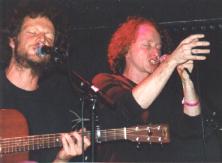 Typical for bands of the so called "folk boom" or "Flemish New Folk Wave" in Belgium is that they have a Pan European influenced musical perspective - it is the first Compact Disc folk musician generation. Says Marc: "This generation grew up with lots of compact discs from all different styles and regions; they seem to fit in a Pan European influenced movement. There are only some vague Flemish roots, and the fact that the performers are Flemish people. But their international succes did draw the attention to the growing Flemish scene."
Typical for bands of the so called "folk boom" or "Flemish New Folk Wave" in Belgium is that they have a Pan European influenced musical perspective - it is the first Compact Disc folk musician generation. Says Marc: "This generation grew up with lots of compact discs from all different styles and regions; they seem to fit in a Pan European influenced movement. There are only some vague Flemish roots, and the fact that the performers are Flemish people. But their international succes did draw the attention to the growing Flemish scene."
"After decades of only a few established groups and artists, as a result of the continuous workshops (Gooik) a new generation of folk musicians finally appeared. Well educated, with good instruments and an Pan European perspective (or even further). This happens suddenly but logical, after all these years of work shops and efforts. It only took about a generation to get a new folk scene. It's also the first time this kind of music is professionaly promoted (Wild Boar Music Label). And we were happy to fall in an international revival of roots music."
The audience grew and changed as well: "Certainly there is a bigger audience for this (enlarged) sub culture. Before everyone associated folk with 'goatwool socks' and bearded old bards. Nowadays it is trendy to use bagpipes, melodeons and fiddles in contemporary music, there is more and more crossover. Promising groups as Laïs, Ambrozijn, Ialma and Olla Vogala get contracts with major labels (EMI, Virgin), and there is a young independant as Wild Boar Music that keeps looking for new talent."
These developments left the whole folk scene flourishing, influencing and supporting also the Celtic scene in Belgium and the Netherlands. An example for an other Pan-European band with unbelievable success is Shantalla, an Irish-Scottish band based in Belgium. Of their current tour, they have had nearly all concerts sold out - and that already in advance!Marc Bekaert agrees about the general positive movements in the scene: "Folk and world orientated festivals (Dranouter, Sfinks) grow every year, while pop festivals have difficulties to survive. Also in cultural centers (and there are a lot of them) folk music gets now a chance."
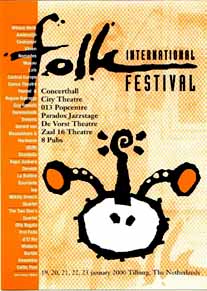 The Tilburg International Folk Festival (presented by FolkWorld Magazine) proved that also new festivals in the Netherlands enjoy directly a huge popularity. This five day festival that took place the first time this January attracted several thousand visitors from the Netherlands and Belgium, but also from Germany and even some well known paying visitors from England (half of Flook! actually).
The Tilburg International Folk Festival (presented by FolkWorld Magazine) proved that also new festivals in the Netherlands enjoy directly a huge popularity. This five day festival that took place the first time this January attracted several thousand visitors from the Netherlands and Belgium, but also from Germany and even some well known paying visitors from England (half of Flook! actually).
The programme of this first festival was tremendous, full of the best international folk music stars, tastefully put together. On Saturday and Sunday a venue with two stages was the centre of the festival, with always parallel concerts. Saturday night saw on the major stage Dervish opening the night (first planned were the Chieftains, who were unfortunately not available that weekend), then the Basque accordeon hero Kepa Junkera with his band, and finally Canada's La Bottine Souriante, one of the world's definite best live acts. They invited for a few numbers Dervish and a few other numbers Kepa Junkera back on stage - an impressive gig. Meanwhile, the second stage featured the Flemish stars (Bub) and Shantalla. The next day had an eight hour programme with a broad European spectrum: Väsen from Sweden, Ceskomor from the Czech Republic, the Flemish bands Ambrozijn and Lais, Scotland's Peatbog Fairies, the Huganrian All Star Band as a feature of the focal country Hungary (there were other Hungarian acts during the first days of the festival). It was a festival with a lot of strength, the most remarkable was the amount of quality and the international popularity of all acts. The festival is now already planning ist second version for January 2001, with the focal country then being Portugal.
The next big new festival in Holland is FolkWoods in August (aug 11-13, 2000) in Eindhoven. It is a 3 day outdoorfestival with 3 stages in tents, with a goal of 2500 entrance paying visitors a day. A line up of ca. 35 bands, featuring Ambrozijn (Belgium), Dereelium (Irish Folk at its best from Germany), Andy Irvine (Ireland), Hoven Droven (Sweden), LAIS (Belgium) and more. The festival will be a five-star festival, in one of the
most beautyful parks of Eindhoven,with outstanding camping facilities, good food and sit-in restaurants, playgrounds for children, child-animation (festival-entrance for under 14 is free), telephone- and paycard/creditcard facilities, and overall accessable for wheelchairs. A line up of appx. 35 bands, workshops, sessions, market (even a little supermarket!!) etc. It looks like a really well orgnaised first festival, and is sure to become a highlight of this festival summer.
 What will happen on a longer term with these folk festivals, with the folk music scene in Holland and Belgium? The Dutch and Belgian experts are carefully optimistic. Marc of "t'Bourdonske" thinks that "as all things go by, this won't last for ever! But we can hope it will continue for some more years. Possibly it still could grow, as only now the international distribution of the Flemish new folk wave really starts." Eltjo of "Celtic Music in Nederland" is more optimistic: "I foresee: it will go on and stabilise."
Eelco of "NewFolkSounds" thinks for Holland that it will be a temporary revival: "Because people found something they think is new. I don't know how long it will take but I think that most festivals won't survive many years. But I hope I am wrong!! I do think that the music gets more influence from other countrys because so many different cultures live in Holland. I think that music will be more international, but I doubt if real folk/worldmusic will be popular for many years."
What will happen on a longer term with these folk festivals, with the folk music scene in Holland and Belgium? The Dutch and Belgian experts are carefully optimistic. Marc of "t'Bourdonske" thinks that "as all things go by, this won't last for ever! But we can hope it will continue for some more years. Possibly it still could grow, as only now the international distribution of the Flemish new folk wave really starts." Eltjo of "Celtic Music in Nederland" is more optimistic: "I foresee: it will go on and stabilise."
Eelco of "NewFolkSounds" thinks for Holland that it will be a temporary revival: "Because people found something they think is new. I don't know how long it will take but I think that most festivals won't survive many years. But I hope I am wrong!! I do think that the music gets more influence from other countrys because so many different cultures live in Holland. I think that music will be more international, but I doubt if real folk/worldmusic will be popular for many years."
He adds, " I also think the name folk has a bad name. We must find a new not as oldfashioned name for this music style. I know from experience that young people don't buy folkmusic by themselves but you must let them hear it. It's funny to see that many of my friends buy folk music since they are friends with me. Before, they would never listened to it and I think their can be a big audience for this music."
Any suggestions for a new name for the folk music style are more than welcome at FolkWorld (who knows what FolkWorld will be called then?).
Photo Credit: All photos by the Mollis:
(1) Logo of Tilburg International Folk Festival; (2) La Bottine Souriante with Dervish at Tilburg International Folk Festival; (3) Lais - stars of the Flemish New Folk Boom; (4) (bub) - new Flemish folk; (5) Ambrozijn - New Flemish Folk; (6) flyer of the Tilburg International Folk Festival; (7) Lais
Back to the content of FolkWorld Articles & live reviews
To the content of FolkWorld online magazine Nr. 13
© The Mollis - Editors of FolkWorld; Published 3/2000
All material published in FolkWorld is © The Author via FolkWorld. Storage for private use is allowed and welcome. Reviews and extracts of up to 200 words may be freely quoted and reproduced, if source and author are acknowledged. For any other reproduction please ask the Editors for permission.
FolkWorld - Home of European Music

Layout & Idea of FolkWorld © The Mollis - Editors of FolkWorld
 "I know the folk music scene in Europe is just in the beginning." Watching the current developments on the folk scene in the Netherlands and Belgium, I had to think of this quote of Carlos Núnez. Two huge new festivals in the Netherlands in 2000, which can well be named among the best international names of festivals like Tønder, Dranouter, Rudolstadt, at the same time an extraordinary success of Flemish bands from Belgium. This is indeed the sign of a new revival, while the background seems to be quite different in both countries.
"I know the folk music scene in Europe is just in the beginning." Watching the current developments on the folk scene in the Netherlands and Belgium, I had to think of this quote of Carlos Núnez. Two huge new festivals in the Netherlands in 2000, which can well be named among the best international names of festivals like Tønder, Dranouter, Rudolstadt, at the same time an extraordinary success of Flemish bands from Belgium. This is indeed the sign of a new revival, while the background seems to be quite different in both countries.
 There is a huge new interest in folk music in Holland, it is like a new folk revival. "Until about 1984 English, Celtic and French folk were very popular in Holland and we even had some great Dutch groups (irolt, chimera, wolverlei etc)", explains Eelco Schilders, young contributor of the Dutch folk magazine NewFolkSounds. "But after a while I think the music wasn't new anymore and only a small group remained listening to the music. Most groups dissappeared and no new groups returned."
There is a huge new interest in folk music in Holland, it is like a new folk revival. "Until about 1984 English, Celtic and French folk were very popular in Holland and we even had some great Dutch groups (irolt, chimera, wolverlei etc)", explains Eelco Schilders, young contributor of the Dutch folk magazine NewFolkSounds. "But after a while I think the music wasn't new anymore and only a small group remained listening to the music. Most groups dissappeared and no new groups returned." So why a revival right now? Eelco Schilders thinks that during the last few years folk got a new impulse, by new bands with new sounds, giving a new dimension to the folk scene. Bands from Scandinavia, but also bands from Belgium or Northern Spain. "They made a young audience listening to traditional music. They liked it and started to listen to more, and suddenly there is a new folkscene in europe with young people and all the 50 year old who are happy that their music is in the spotlights again."
So why a revival right now? Eelco Schilders thinks that during the last few years folk got a new impulse, by new bands with new sounds, giving a new dimension to the folk scene. Bands from Scandinavia, but also bands from Belgium or Northern Spain. "They made a young audience listening to traditional music. They liked it and started to listen to more, and suddenly there is a new folkscene in europe with young people and all the 50 year old who are happy that their music is in the spotlights again." This fact is well represented in the organisational team of the Folkwoods Festival, happening in August in Eindhoven for the first time and featuring ca. 35 international folk music bands. It is organized by three persons being "just fans of good music". One of them, Tinus Kanters, is founder and organizer of the well-known Eindhoven Dynamo Open Air Hardrockfestival, with up to 100.000 visitors from all over Europe. He also organized some outdoor-classical concerts at a footbal stadium in Eindhoven. Yet 25 years ago he was also involved in the organization of the folk-club in Eindhoven. The second man, Hans Sanders, is known as a singer of Europe-wide known pop band "Bots", owning these days a pub in Eindhoven with weekly live music (often folk). Then Chris Aelbers from Belgium, currently managing director of the Beursgebouw, the main exhibition hall of Eindhoven. He used to be one of the founders and organizers of the Bilzen Festival in Belgium about 25 years ago, and he organized over 200 events in Eindhoven the last 15 years.
This fact is well represented in the organisational team of the Folkwoods Festival, happening in August in Eindhoven for the first time and featuring ca. 35 international folk music bands. It is organized by three persons being "just fans of good music". One of them, Tinus Kanters, is founder and organizer of the well-known Eindhoven Dynamo Open Air Hardrockfestival, with up to 100.000 visitors from all over Europe. He also organized some outdoor-classical concerts at a footbal stadium in Eindhoven. Yet 25 years ago he was also involved in the organization of the folk-club in Eindhoven. The second man, Hans Sanders, is known as a singer of Europe-wide known pop band "Bots", owning these days a pub in Eindhoven with weekly live music (often folk). Then Chris Aelbers from Belgium, currently managing director of the Beursgebouw, the main exhibition hall of Eindhoven. He used to be one of the founders and organizers of the Bilzen Festival in Belgium about 25 years ago, and he organized over 200 events in Eindhoven the last 15 years. This year saw already the first highly successful edition of Tilburg International Folk Festival, and at the same time a lot of smaller festivals spring up in Holland. Eltjo: "Professional organisers discovered the folk music now. And a few old "folkies" became professional."
This year saw already the first highly successful edition of Tilburg International Folk Festival, and at the same time a lot of smaller festivals spring up in Holland. Eltjo: "Professional organisers discovered the folk music now. And a few old "folkies" became professional." Typical for bands of the so called "folk boom" or "Flemish New Folk Wave" in Belgium is that they have a Pan European influenced musical perspective - it is the first Compact Disc folk musician generation. Says Marc: "This generation grew up with lots of compact discs from all different styles and regions; they seem to fit in a Pan European influenced movement. There are only some vague Flemish roots, and the fact that the performers are Flemish people. But their international succes did draw the attention to the growing Flemish scene."
Typical for bands of the so called "folk boom" or "Flemish New Folk Wave" in Belgium is that they have a Pan European influenced musical perspective - it is the first Compact Disc folk musician generation. Says Marc: "This generation grew up with lots of compact discs from all different styles and regions; they seem to fit in a Pan European influenced movement. There are only some vague Flemish roots, and the fact that the performers are Flemish people. But their international succes did draw the attention to the growing Flemish scene." The Tilburg International Folk Festival (presented by FolkWorld Magazine) proved that also new festivals in the Netherlands enjoy directly a huge popularity. This five day festival that took place the first time this January attracted several thousand visitors from the Netherlands and Belgium, but also from Germany and even some well known paying visitors from England (half of Flook! actually).
The Tilburg International Folk Festival (presented by FolkWorld Magazine) proved that also new festivals in the Netherlands enjoy directly a huge popularity. This five day festival that took place the first time this January attracted several thousand visitors from the Netherlands and Belgium, but also from Germany and even some well known paying visitors from England (half of Flook! actually).